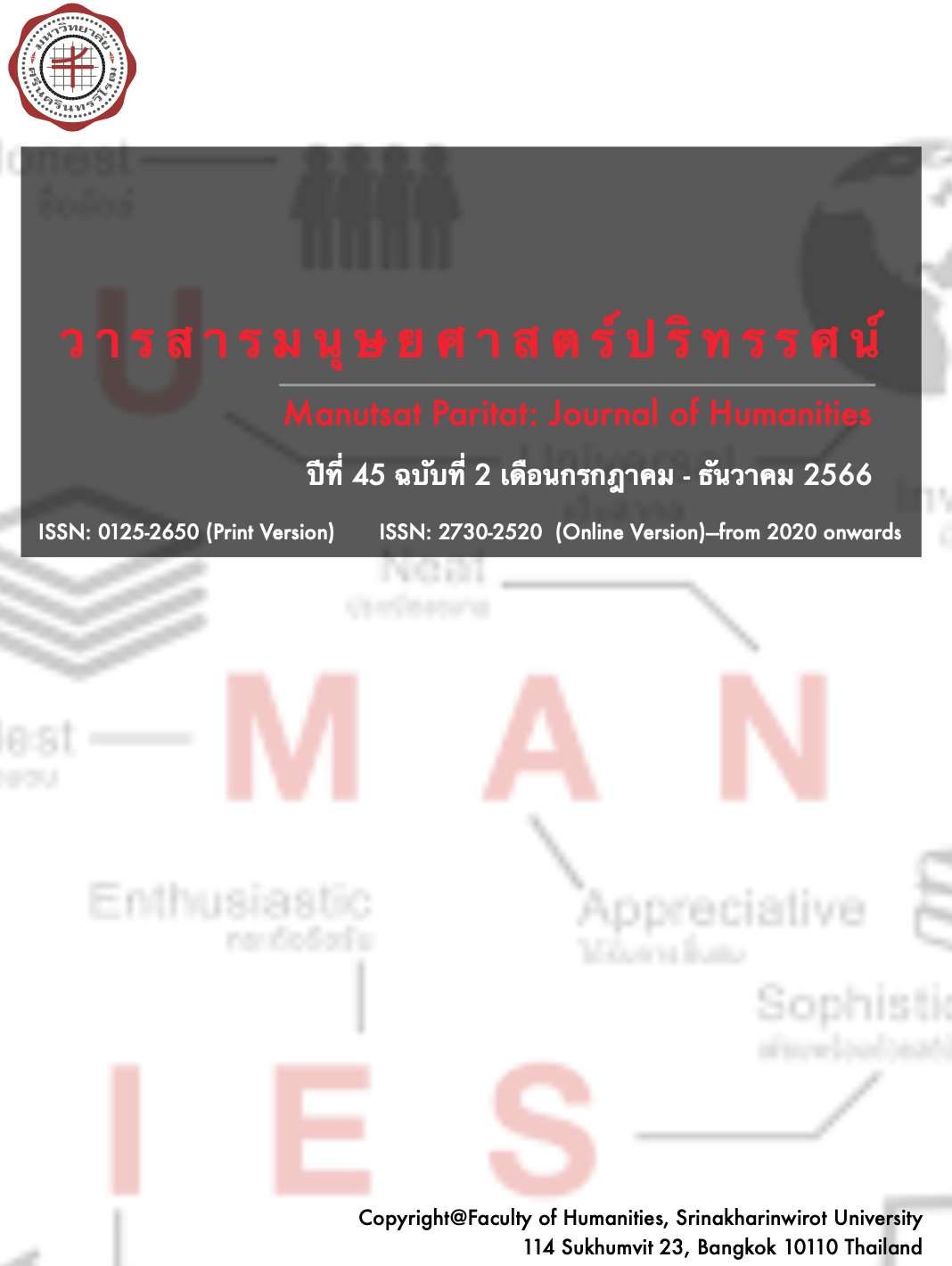ความเชื่อใจต่อผู้มาใหม่ของสังคม
##plugins.themes.bootstrap3.article.main##
摘要
นักทฤษฎีเกมอ้างว่า ความเชื่อใจคือทางออกของสถานการณ์จำยอมสารภาพของนักโทษ โดยความเชื่อใจนั้น ต้องเกิดขึ้นภายใต้เงื่อนไขของประโยชน์แบบต่างตอบแทน เมื่อคนสองคนเป็นคนแปลกหน้าต่อกัน แม้จะมีความเป็นไปได้ว่าจะเชื่อใจกัน แต่ความเชื่อใจนั้นจะเกิดขึ้นได้ยากกว่าเมื่อสองคนคุ้นเคยกัน ในกรณีที่คนหนึ่งคือคนแปลกหน้าผู้มาเยือนถิ่นใหม่ และอีกคนหนึ่งคือคนท้องถิ่นในพื้นที่แห่งนั้น คนท้องถิ่นไม่มีความจำเป็นต้องมีปฏิสัมพันธ์กับคนแปลกหน้าที่เพิ่งมาเยือน หรือหากเลือกมีปฏิสัมพันธ์ด้วยแล้ว ก็ไม่มีเหตุผลใดที่เขาจะเชื่อใจคนแปลกหน้านั้นว่าจะไม่ทำอันตรายหรือไม่หักหลัง ในขณะที่คนแปลกหน้า อาจต้องการมีปฏิสัมพันธ์กับคนท้องถิ่นคนนั้นเพื่อเพิ่มโอกาสในการมีชีวิตรอดและตั้งถิ่นฐานใหม่ จึงเป็นเหตุผลที่ดีที่จะเชื่อใจคนท้องถิ่นนั้น เมื่อความมีเหตุมีผลเชิงความเชื่อในฝั่งหนึ่งตึงแย้งกับความมีเหตุมีผลเชิงปฏิบัติในอีกฝั่งหนึ่งเช่นนี้ จึงเกิดคำถามขึ้นว่า ความเชื่อใจรูปแบบใดที่ใช้เป็นฐานให้แก่ปฏิสัมพันธ์ที่เป็นความร่วมมือกันระหว่างคนแปลกหน้าในสถานการณ์เช่นนี้ได้ บทความนี้สำรวจและวิเคราะห์คำอธิบายเรื่องความเชื่อใจของนักปรัชญาสามกลุ่มคือ ทฤษฎีเกม ทฤษฎีปริชานนิยม ได้แก่ คำอธิบายของรัสเซล ฮาร์ดิน และเบริสลาฟ มารูซิค และทฤษฎีกลุ่มอปริชานนิยม ได้แก่ คำอธิบายของแอนเน็ตต์ แบร์ และคาเรน โจนส์ โดยเสนอว่าคำอธิบายแบบอปริชานนิยมของโจนส์สามารถเป็นคำตอบสำหรับเรื่องนี้ได้ เนื่องจากแนวคิดที่ว่าฝ่ายที่แสวงหาความเชื่อใจต้อง ตั้งมั่นและแสดงออกถึงความสามารถ ที่มีให้ปรากฏ เพื่อให้ฝ่ายที่ถูกคาดหวังให้มอบความเชื่อใจใช้สิ่งนี้เป็นฐานก่อรูปความเชื่อใจที่เป็น จุดยืนที่เป็นเชิงบวกต่อเจตนาดีและความสามารถสร้างคุณูปการ ต่อตัวเขาตามมา เป็นแนวคิดที่ตอบสนองความมีเหตุมีผลเชิงความเชื่อและความมีเหตุมีผลเชิงปฏิบัติสำหรับทั้งสองฝ่ายได้ในเวลาเดียวกันในแบบที่คำอธิบายอื่นทำไม่ได้
##plugins.themes.bootstrap3.article.details##
Any unauthorized copying, publication, reproduction or distribution of copyrighted works appeared in Manutsat Paritat: Journal of Humanities is an infringement of the copyright owners’ rights. To authorize the copying, publication, reproduction or distribution of copyrighted works to be appeared in other printed materials or any online media, please write to MPJHthaijo@gmail.com for permission.
参考
Aubert, V. (2006). Competition and dissensus: Two types of conflict and of conflict resolution. In D. Druckman & P. F. Diehl (Eds.), Conflict Resolution (pp. 129-148). Sage Publications.
Axelrod, R. (1984). The evolution of cooperation. Basic Books.
Baier, A. (1986). Trust and antitrust. Ethics, 96(2), 231-60.
Carens, J. (2013). The ethics of immigration. Oxford University Press.
Chignell, A. (2018). The ethics of belief. In E. N. Zalta (Ed.), The Stanford Encyclopedia of Philosophy (Spring 2018 Edition). https://plato.stanford.edu/archives/spr2018/entries/ethics-belief/
Dasgupta, P. (1988). Trust as a commodity. In D. Gambetta (Ed.), Trust: Making and breaking cooperative Relation (pp. 49-72). Blackwell.
Denning, D. E. (1993, August). A new paradigm for trusted systems. Proceedings on the 1992-1993 workshop on New security paradigms (pp. 36-41). USA. https://doi.org/10.1145/283751.283772
Elster, J. (1976). Some conceptual problems in political theory. In B. Barry (Ed.), Power and political theory: Some European perspectives (pp. 245-270). Wiley.
Elster, J. (1979). Ulysses and the sirens: Studies in rationality and irrationality. Cambridge University Press.
Elster, J. (2007). Explaining social behavior. Cambridge University Press.
Frost-Arnold, K. (2014). The cognitive attitude of rational trust. Synthese, 191(9), 1957-1974.
Gambetta, D. (1988). Trust: Making and breaking cooperative relation. Blackwell.
Good, D. (1988). Individuals, interpersonal relations, and trust. In D. Gambetta (Ed.) Trust: Making and breaking cooperative relation (pp. 139-167). Blackwell.
Hardin, R. (1996). Trustworthiness. Ethics, 107, 26-42.
Hardin, R. (2002). Trust and trustworthiness. Russell Sage Foundation.
Hawley, K. (2014). Trust, distrust and commitment. Nous, 48(1), 1-20.
Ho, T. S. (2022). Positive Illusion and the normativity of substantive and structural rationality. Philosophical Explorations. DOI: 10.1080/13869795.2022.2160876
Hofstede, G., & Hofstede, G. J. (2005). Cultures and organizations: Software of the mind, revised and expanded (2nd ed.). McGraw-Hill.
Holton, R. (1994). Deciding to trust, coming to believe. Australasian Journal of Philosophy, 72(1), 63-76.
Jones, K. (1996). Trust as an affective attitude. Ethics, 107, 4–25.
Jones, K. (1999). Second-hand moral knowledge. The Journal of Philosophy, 96(2), 55–78.
Jones, K. (2012). Trustworthiness. Ethics, 123(1), 61-85.
Jones, K. (2019). Trust, distrust, and affective looping. Philosophical Studies, 176(4), 955–968.
Kopec, M., & Titelbaum, M. G. (2015). The Uniqueness thesis. Philosophy Compass, 11(4), 189-200.
Levy, N. (2022). In trust we trust: Epistemic vigilance and responsibility. Social Epistemology, 36(3), 283-298.
Luce, D., & Raiffa, H. (1957). Games and decisions: Introduction and critical survey. Wiley.
Marušić, B. (2015). Evidence and agency: Norms of belief for promising and resolving. Oxford University Press.
Natarajan, S. (2018, November 2). The man who spent decades befriending isolated Sentinelese tribe. BBC News. https://www.bbc.com/news/world-asia-india-46350130
O’Neill, O. (2002). A question of trust: The BBC Reith lectures. Cambridge University Press.
Pandit, T. N., & Chattopadhyay, M. (1989). Meeting the Sentinel islanders: The least known of the Andaman hunter-gatherers. Journal of the Indian Anthropological Society, 24, 169-178.
Pandit, T. N. (1990). The Sentinelese. Seagull Books.
Pettit, P. (1995). The cunning of trust. Philosophy & Public Affairs, 24(3), 202-225.
Pekka, M. (2013). Desire for esteem as reason for trust. In M. Pekka & C. Townley (Eds.), Trust: Analytic and applied perspectives (pp. 119-129). Brill.
Schelling, T. C. (1960). The strategy of conflict. Harvard University Press.
Sen, A. K. (1977a). Rational fools: A critique of the behavioral foundations of economic theory. Philosophy & Public Affairs, 6(4), 317-344.
Sen, A. K. (1977b). Rationality and morality: A reply. Erkenntnis, 11(2), 225-232.
Stalberg, A. (2021, November 12). How Isekai became anime’s most popular genre. Game Rant. https://gamerant.com/how-isekai-genre-became-so-popular/
White, R. (2005). Epistemic permissiveness. Philosophical Perspectives, 19, 445-459.
Williams, B. (1981). Problems of the self. Cambridge University Press.
Winters, B. (1979). Believing at will. Journal of Philosophy, 76(5), 243-256.
Witteloostuijn, A. (2003). A game-theoretic framework of trust. International Studies of Marketing and Organization, 33(3), 53-71.
Worsnip, A. (2018). What is (in)coherence. In R. Shafer-Landau (Ed.), Oxford studies in metaethics 13 (pp. 184-206). Oxford University Press.


